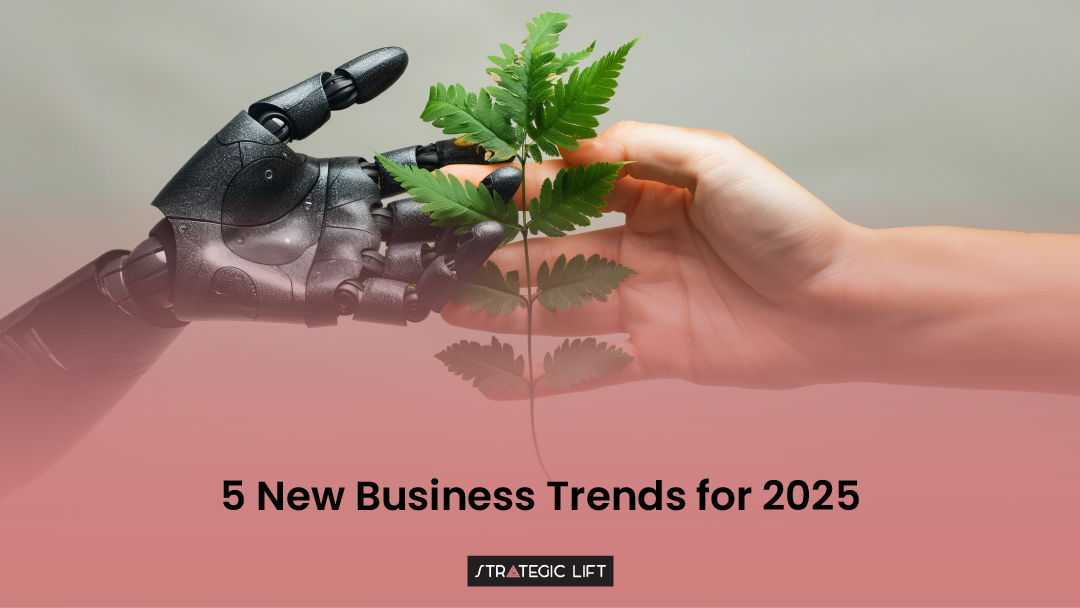
5 New Business Trends for 2025
2025 promises to be a year of transformation, with technological innovations, shifts in consumer behavior, and evolving workplace dynamics influencing industries worldwide. Here are five key business trends to watch in 2025 and how they can impact your company’s strategy.
1. AI-Powered Customer Experience Transformation
Artificial Intelligence (AI) continues to evolve and reshape industries, and in 2025, AI’s role in customer experience (CX) will reach new heights. From personalized product recommendations to predictive analytics, businesses will leverage AI to enhance every touchpoint of the customer journey.
- Hyper-Personalization: AI will allow businesses to create ultra-tailored customer experiences by analyzing vast amounts of customer data. This includes personalized email marketing, content, and even product offerings based on individual behaviors and preferences.
- Improved Customer Service: AI-powered chatbots and virtual assistants will be integrated into customer service platforms, providing faster and more accurate responses to inquiries, resolving issues in real-time, and enhancing customer satisfaction.
- Predictive Analytics: By leveraging AI-driven data, businesses can predict future customer behaviors, helping brands stay ahead of trends and offer proactive solutions.
2. Sustainability and Green Business Practices as a Competitive Edge
As consumers become more environmentally conscious, the demand for sustainability will be a defining factor for businesses in 2025. Companies that prioritize sustainable practices, from eco-friendly products to reducing carbon footprints, will build stronger connections with customers.
- Eco-Friendly Products and Services: Consumers will increasingly choose brands that offer sustainable products, packaging, and services. Businesses will need to integrate eco-friendly options into their offerings to stay competitive.
- Green Certifications and Transparency: Certifications like Fair Trade, LEED, and Carbon Neutral will be more important in 2025, as consumers look for brands that are transparent about their environmental impact.
- Corporate Social Responsibility (CSR): Companies will need to demonstrate a commitment to environmental sustainability through measurable actions, from reducing waste to supporting green initiatives.
3. Remote and Hybrid Work Culture Evolution
The COVID-19 pandemic dramatically shifted how businesses approach remote work, and in 2025, this trend will evolve into a more permanent fixture in many industries. Companies will refine hybrid work models, offering flexible options that cater to diverse employee needs while maintaining productivity and collaboration.
- Flexible Work Arrangements: A hybrid workforce will become the norm, with employees splitting time between the office and home or other locations. Businesses must ensure they have the right tools and technology to support remote collaboration.
- Focus on Employee Well-being: Businesses will place more emphasis on mental health, work-life balance, and employee satisfaction to attract and retain top talent. Offering flexible hours, mental health support, and remote work options will be essential.
- Investment in Collaboration Tools: Teams will rely more on digital tools like Zoom, Slack, and Asana to stay connected, while also adopting more advanced tools for virtual brainstorming and collaboration.
4. The Rise of Web3 and Blockchain Technologies
Web3 and blockchain technologies are making waves in 2025, and they are expected to bring significant changes to how businesses operate. With Web3 empowering decentralized internet services and blockchain revolutionizing transactions and supply chain management, businesses will begin to explore how these technologies can improve security, transparency, and trust.
- Decentralized Finance (DeFi): Businesses in financial services, real estate, and retail are looking at blockchain and Web3 platforms for more secure, transparent, and efficient transactions.
- Supply Chain Transparency: Blockchain can provide tamper-proof tracking of products from production to delivery, helping businesses ensure ethical sourcing and reduce fraud.
- NFTs for Branding and Loyalty Programs: Non-fungible tokens (NFTs) are evolving beyond art into unique digital assets that businesses can use for customer engagement, loyalty programs, and limited-edition product offerings.
5. Data Privacy and Security in the Spotlight
With increasing concerns over data privacy, businesses will be under more pressure in 2025 to adopt stringent security measures and ensure transparent data handling practices. With legislation such as GDPR and CCPA already in place, more regulations are expected to follow.
- Stronger Data Protection Policies: Companies will need to implement stronger encryption and security measures to protect customer data from breaches and cyber threats.
- Transparent Data Practices: Consumers will demand more transparency regarding how their data is used, so businesses will need to clearly communicate data collection practices and gain explicit consent for data use.
- Compliance with New Regulations: As data privacy laws become stricter, businesses must stay ahead of legal changes and invest in tools to ensure compliance.
Preparing for a Transformative 2025
The business landscape in 2025 will be shaped by technological advancements, evolving customer expectations, and an increased focus on sustainability and transparency. By embracing AI, sustainability, hybrid work models, blockchain technologies, and prioritizing data security, businesses can position themselves for success in this rapidly changing environment.
To thrive in 2025, businesses must remain agile, invest in the right tools, and ensure they are aligned with emerging trends. The companies that succeed will be those that not only adapt but lead in creating positive, meaningful change.




